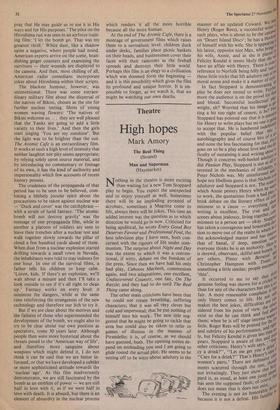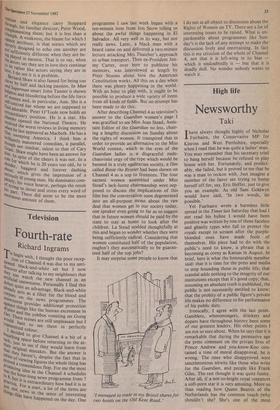Theatre
High hopes
Mark Amory
The Real Thing (Strand) Man and Superman (Haymarket)
Nothing in the theatre is more exciting than waiting for a new Tom Stoppard play to begin. You expect the unexpected and to enjoy yourself as well. Sometimes there will be an imploding pyramid of acrobats, sometimes a Magritte come to life, always there will be jokes. This time an added interest was the question as to which direction he would go in now. Criticised for being apolitical, he wrote Every Good Boy Deserves Favour and Professional Foul, the best television play I have seen, both con- cerned with the rigours of life under com- munism. The surprise about Night and Day was the extent to which it was a conven- tional, if witty, debate on the freedom of the press. Since then we have had his only bad play, Cahoots Macbeth, communism again, and two adaptations, one excellent, Undiscovered Country, one fair, On The Razzle; and they had to do until The Real Thing came along.
The other main criticisms have been that he could not create breathing, suffering characters; that it was all very clever but cold and impersonal; that he put nothing of himself into his work. The new title sug- gested that he might be going to tackle that area but could also be taken to refer to games of illusion in the manner of Pirandello; it is, of course, as we should have guessed, both. The opening scenes de- pend on misleading you and I am going to glide round the actual plot. He seems to be setting off to be witty about adultery in the manner of an updated Coward. We 11/16 Henry (Roger Rees), a successful writet,-, such plays, who is about to be the casta",,' on 'Desert Island Discs'; he has a 1-1°Ck,11; of himself with his wife. She is apPearal'io his latest, opposite nice Max, who bringsi his wife, Annie, and as she is played Felicity Kendal it seems likely that she "I have an affair with Henry. There is evenof reference to Norfolk being hilly and `°11,e,bc those little tricks that lift adultery out moral arena and make it a matter of stYleh In fact Stoppard is demonstrating to, play he does not intend to write. FlIftfto more the audience is on the prowl for ';,). and blood. Successful intellectual P0'1, wright, eh? Worried that his image ispger ting a bit too right of centre, is he? Stoppard has pointed out that it is essen1.0 for Henry to write plays but no one is g?iels to accept that. He is lumbered indenn'. is with the popular belief that this ate autobiography and of course bits of it tit and none the less fascinating for that F°dif. goes on to be a play about love and the t R. ficulty of sustaining it and writing ahait, Though it concerns well-heeled aclultejiirr did Passion Play, Stoppard is not at a' as terested in the mechanics of infidelitY:id I Peter Nichols was. My uninformed a'.;.ap hope not libellous guess is that Nichols l'e is adulterer and Stoppard is not. The sett/4 which Annie pesters Henry when he "v's,, to work, the quotations from a bad Pla:01. brisk debate on the literary effect of boo, mitment to a cause — everything, afaise writing is excellent. The true an coo' scenes about jealousy, living together, and mitment to a person are — okaY. Sta,PPdeci' has taken a courageous and honorable tie sion to move out of the realm in whichterd the acknowledged master and has etibeti that of banal, if deep, emotion;rette everyone thinks he is an authority. 1400 is shrewd, observant, skilful and hone5d are others. Pinter with BetraYai did Christopher Hampton with Treats tired something a little similar; people Marra `th' in. It occurred to me to say that Orel genuine feeling was shown for a cricke.'. than for any of the characters but this.Isthe fair. A more reasonable comPlaiat :500 only Henry comes to life. He n°. coa makes the best jokes, difficulties arefop sidered from his point of view, the ailloti exist so that he can think and feel „es, them; when he is off stage interest gi._3;fire little. Roger Rees will be praised for °re and subtlety of his performance, allf1.300 ly, but Felicity Kendal is given less t`',, mostpears. Stoppard is aware of this all,'fair other criticisms. Henry's wife says, cy a drink?", "Let me get you a 'fool "Care for a drink?" That's Henrys I coif women's parts.' There are defensivebooll ments scattered through the text, ft stor not irritatingly. They just show tha'aliescl. pard is, as usual, at least one PIO has seen the supposed fault; of co does not mean that it does not exist" defeat The evening is not an honorable..a.deor ifl" because it is not a defeat. His farml vention and elegance carry Stoppard through, his familiar director, Peter Wood, t3.111Plementing them; but it is less than a '"Pit A weakness, the blame for which I cannot attribute, is that scenes which are cleverly designed to echo one another are not sufficiently different when they are be- ini,g Played in earnest. That is to say, when sue actors say they are in love they continue ,cI0ve be rather like actors saying they are in I. I i do see it is a problem. :Bernard Shaw is also famed for being too ever by half and lacking passion. In Man 1.1,(1 SuPerman smart John Tanner is shown o'f'Pless and blundering before the life force %to:Palen and, in particular, Ann. She is a sfelf-centred liar whom we are supposed to Ind adorable. Peter O'Toole now holds an eharaordinary position. He is a star. His ,..01/1,1e/ opened the National Theatre. He w`bcelved the worst reviews in living memory filen he last appeared as Macbeth. He has a b1,11)1,. sweePing America. I think him a though mannered comedian, a parallel, not similiar, talent to that of Cary hi—nt. Shaw might have been an answer for 11,1• In spite of the cheers it was not. In is sto'e for which he is 20 years too old, he is abe„11,.ci,er' haggard and forever dashing se;ul, which gives the impression of a Di'lnuslY ill young man. He dominates corn- ,„etelY, his voice hoarse, perhaps the result 11‘,1 try 14 to shout and stress every word of en- Part. There did seem to be the most "nrntous amount of them.











































 Previous page
Previous page